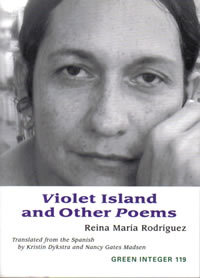Poetry from Cuba, the Violet Island: Reina María Rodríguez
There are rare, shimmering moments in life when we connect with beauty in a way that moves us profoundly.
Cuban Poet Reina María Rodríguez, View from her rooftop apartment in Havana.
It might happen when we first see a long-admired painting in person or hear the power of Beethoven’s 9th symphony performed with a full orchestra. I’ve experienced it during those dark nights when a few lines in a book suddenly reveal deep personal meaning. For each individual the event that might illuminate a life is unique, but the feeling is universal.
Such a moment happened for me in January 2012 during a visit to the Havana apartment of acclaimed Cuban poet Reina María Rodríguez. From her rooftop garden, with the setting sun casting its golden glow over the slowly crumbling buildings behind her, she gathered together selections from her sensitive, exquisite poetry and released them like angels into the sky. I was moved beyond words when she concluded her reading by saying, “In this moment, I feel my poetry has some importance.”
As I traveled with a small group of professional researchers, visiting Reina’s welcoming Havana home to hear her discuss her work and then read for us was one of the unforgettable highlights of my first trip to the island. For many of us in the United States, Cuba only exists as a collage of images from pre-embargo days: Hemingway, Sinatra, Ava Gardner, fifties automobiles with big grills and flaring fins, primo cigars and highball glasses filled with molasses-colored rum consumed by wealthy people in fancy dress—and everywhere the syncopation of Afro-Caribbean music. As with stories of the legendary isle of Atlantis, if you haven’t been there it’s hard to separate reality from nostalgia. Today with restrictions eased, more tourists are able to enjoy a taste of all that this island, long isolated from the United States, has to offer.
From my perspective, while the iconic players have changed and the magical, pastel-hued city of Havana has aged less than gracefully, the vibrant culture of Cuba and its people’s warm welcome to visitors have not. The afternoon spent with Reina María Rodríguez is but one shining example.
Reina María was only eight years old when Fidel Castro came to power. She grew up and began writing as vast, radical changes evolved in Cuba’s social, political, and economic life. Her poetry is filled with deep metaphorical imagery, questions contemporary Cuban culture, and reveals her own erotic and personal life experiences. She has received extensive recognition outside the United States as a winner of the Casa de las Americas poetry prize, the UNEAC and the Julian del Casal prizes, and, in August 2014, the Pablo Neruda Ibero-American Poetry prize.
One of Rodríguez’s best known poetry collections, published by Green Integer (2004) in the United States is Violet Island and Other Poems, with translations by Kristin Dykstra and Nancy Gates Madsen. As expressed in this slim volume,
Rodríguez offers the freedoms of a revised vision, a revolutionary gaze that depends not on freezing the hands of time, but on embracing its motion. In her poetic testimonies, it is not any single moment of triumph that gives meaning to revolution, but the everyday, intimate, and ambivalent experiences that citizens share—even if they know heroes and history only from a distance.
Reina María is a revolutionary within Cuba’s political evolution. Beyond the intellectual challenges of her work, for two decades her seven-story walk-up, informally known as la azotea de Reina, an intellectual salon, has provided a space for readings and discussions where writers and artists could depart from party lines and weave more textured self-expression. The stairwell leading to her front door is dark, the walls dilapidated and crumbling, the handrail leaning to one side. Perhaps this passage serves metaphorically to represent some of the poet’s journey. In contrast, as you enter her home you are surrounded by bright colors, rooms filled with light from the sky beyond her rooftop garden, collections of books and art, music, and the certainty that here ideas are rigorously embraced.
May we all be embraced and surrounded by such beautiful moments—
# # #Additional ResourcesTo hear Reina reading selections from her work, go to the University of Pennsylvania’s Center for Programs in Contemporary Writing. To experience the full beauty and power of Reina María’s poetry, read “Memory of Water,” translated from the Spanish by Joel Brouwer and Jessica Stephenson, and published in the June 2011 issue of Poetry magazine. Be sure to check out the red tab “About this poem” on the right-hand side of the page.


